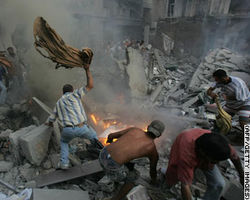UnNews:Rare series of earthquakes continue in the Israel-Lebanon region
| This article is part of UnNews, your source for up-to-the-picosecond misinformation. |
26 July 2006
BEIRUT, Lebanon - On July 13, 2006, a 7.2 mangitude earthquake struck the airport of Beirut, surpising many travelers. Reports indicated that the runways of the airport "just seemed to crumble before us." The earthquake left much of the airport inoperable but surrounding structures appeared to be fine. Flights into the airport had to be diverted to Cyprus in mean time.
A few hours later, the aftershocks of the earthquake struck further areas, devastating more of the area around Beirut. As time progressed, more aftershocks had already spread across Southern Lebanon, bewildering many of the citizen of the country. "You could see buildings collapse, it was very terrifying. I didn't think I could leave in time." said one citizen. "Even as we speak now, you can feel the shakes of the ground and hear the buildings crumble. I don't think I'll have any other choice but to leave the country." In light of this situation, many countries promptly commanded all their citizens to leave the country before the aftershocks grew to immense proportions.
Israeli Minister of Defence, Amir Peretz, quickly ordered a blockade around the country of Lebanon in hopes of keeping the earthquakes inside the country without them spreading across the border. Attempts at this have failed miserably. Early indications had noted that the blockade was not established in enough time and aftershocks were already being felt in Nahariya and Safed.
Initial responses from both Israel and Lebanon indicated an agreement to 'wait out' the situation in hopes of the aftershocks to die off.
Secretary-General Kofi Annan warned of a humanitarian disaster if the aftershocks of the earthquake weren't taken care of in enough time. He asked Prime Minister Ehud Olmert to send Israeli troops to deal with the situation in Southern Lebanon to try and route of the source of the continuous disaster. Lebanon Prime Minister Fouad Siniora also assured Annan he would take all measures to stop this disaster. He indicated he had already ordered the Lebanense military to dig holes across the country in search of what could be 'possibly causing this insanity.' "I hope that we move forward in the next day or two, things will crystallize, and that the parties will be prepared to do this," Annan said in an interview broadcast with CNN's Larry King. "Otherwise, Larry, I'm afraid of a major humanitarian disaster."
By July 23, 2006, The Israeli Defence Force had already entered Southern Lebanon into the Maroun al-Ras area and claimed to have taken control of many "earthquake generators" in the region. While these claims have been disputed, the IDF has come under increasingly heavy resistance by the earthquakes, knocking over many Israeli soldiers.
